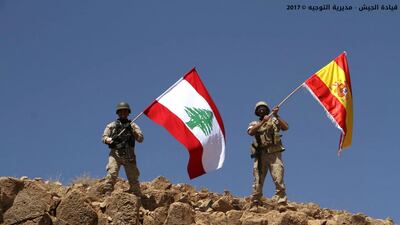Last Thursday, ISIL terrorists bloodied the streets of Barcelona, using a van to murder and maim pedestrians in the city's busiest thoroughfare. It was an act of savagery designed to terrorise and sow division among people. The worst of humanity had to be met with the best. And the Spanish rose to the challenge with remarkable valour. They were soon joined by Lebanese soldiers, who on Saturday raised a Spanish flag alongside their own on a hill seized from ISIL in the Jurud Ras Baalbek region. "A salute from our troops fighting ISIL", the Lebanese army said in a statement, "to the victims [of ISIL] in Spain and the whole world". This profoundly moving show of solidarity by the Lebanese with Spain ought to remind the world that ISIL is a universal threat. Defeating ISIL will require throwing unflinching support behind those on the front lines in the war against it.
Iraqi ground forces, backed by the United States, are right now engaged in a fierce offensive to retake Tal Afar, one of the last remaining strongholds of ISIL in the country. This is a crucial battle, given that Tal Afar, situated on the border with Syria, has long been used by ISIL as a conduit for the transfer of men and materiel. The Iraqi army has been making steady gains since operations began on Sunday: villages in the east, south-west and north-west of the city have already been liberated. ISIL cannot hold on for long.
Yet the victory at Tal Afar, when it comes, will not be final. As this newspaper has long argued, physically routing ISIL is a crucial aspect of the overall strategy. What comes after - the battles to defeat the toxic ideology that ISIL spreads, and to redress the grim conditions that allowed its extremism to thrive - will be just as important.
ISIL has transformed parts of this region into some of the most heavily mined places on Earth. Displaced people returning home in the past have been killed by booby traps left behind by retreating ISIL fighters in mosques, schools, hospitals and homes. Iraqi forces have been clearing away mines in liberated Mosul. But as the head of the United Nations Mine Action Service warned in April, demining the whole region once ISIL is crushed could take up to five decades and cost more than $180 million (Dh661m) annually.
This estimate - $9 billion (Dh33bn) over five decades - may sound like a lot of money, but is in fact only a fraction of the $2.2 trillion (Dh8tn) Washington spent on the invasion of Iraq. Washington has tightened its purse strings. But Iraq, Lebanon and other parts of this region will require sustained help from the international community. Disengagement will recreate the very circumstances that ISIL exploited in the first place. The world must strive to emulate the solidarity of Lebanon with Spain. Only unity will defeat ISIL in all its forms.

